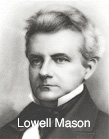 By 1800 the winds of change were already blowing. The psalm tunes, anthems, and set pieces composed by English country composers and the Yankee tunesmiths, so popular in early America, were being criticized by the musical elite. In retrospect we value as a national treasure the fudging tunes, the harmonies with open fifths, bald parallelisms, and abrupt dissonances, and the rollicking melodies of the tradesmen-composers like William Billings , Daniel Read, Oliver Holden, and Lewis Edson. But the reformers of the first half of the 19th Century considered this music crude, uncultivated, inferior, and in bad taste.
By 1800 the winds of change were already blowing. The psalm tunes, anthems, and set pieces composed by English country composers and the Yankee tunesmiths, so popular in early America, were being criticized by the musical elite. In retrospect we value as a national treasure the fudging tunes, the harmonies with open fifths, bald parallelisms, and abrupt dissonances, and the rollicking melodies of the tradesmen-composers like William Billings , Daniel Read, Oliver Holden, and Lewis Edson. But the reformers of the first half of the 19th Century considered this music crude, uncultivated, inferior, and in bad taste.
In recalling the history of American congregational music in the preface to his National Psalmist the reformer Lowell Mason put William Billings at the head of a class of inferior American composers. He said that Billings was “quite ignorant of the principles of harmony and composition” and was followed by “a host of composers, most of whom were as ignorant as himself . . . and the most silly and contemptible trash imaginable in the form of psalm tunes, preposterous and profane, overspread the land like the locusts of Egypt.” The goal of reformers like Lowell Mason, Thomas Hastings, and The Boston Handel and Haydn Society was the “improvement of church music” and the “refinement of public taste” in the area of hymnody and choral church music. Specifically, they were concerned with the practicalities of congregational singing and the proper function of the choir; but the correction of harmonic practice after the European model was the top priority—the music of Handel, Mozart, Haydn, and Beethoven was held in high esteem. The reformers also decried the elaborate tunes of the older music (like ST. MARTINS) and composed simple tunes that were deemed singable by a congregation. (Interestingly, Mason put a footnote under the tune ANTIOCH ("Joy to the Worlds") suggesting that it should be sung by the choir since he considered it inappropriate for congregational singing.)
The influence of the reform movement was enormous, especially in the Northeast, and composers of “the most approved tunes” flooded the market with new hymnals containing “refined” and “scientific” music. The early American tunes that remained because of their popularity were “corrected,” greatly changing the elements that made them distinctive. An excellent example is found in Lowell Mason's alterations of William Billing's MAJESTY in The National Psalmist, 1848, where Mason makes "slight" changes to the tune and makes the harmony "conform to the universally acknowledged laws of music science." Not everyone, however, was quick to eliminate the "inferior" harmonies of earlier days. D. H. Mansfield in The American Vocalist, 1848, reprints MAJESTY almost note-for-note from Billing's original. Mansfield explains his love for the old harmonies in the preface:
In every part of the United States, even where new music is sung in the public congregation because it is fashionable, let any one mingle with the devout worshippers of God in their social meetings, and he will hear—not the scientific gingling [an earlier spelling of jingling] of imported discord, but the simple harmony of old “Turner,” “Northfield,” the “Union Hymn,” or something that moves the hearts of good men, if it does not tickle the fastidious fancy of infidels.
Most denominational tunebooks from the first half of the 19th century reflect the influence of the reformers. Many tunes by Mason and Hastings appear in modern hymnals.